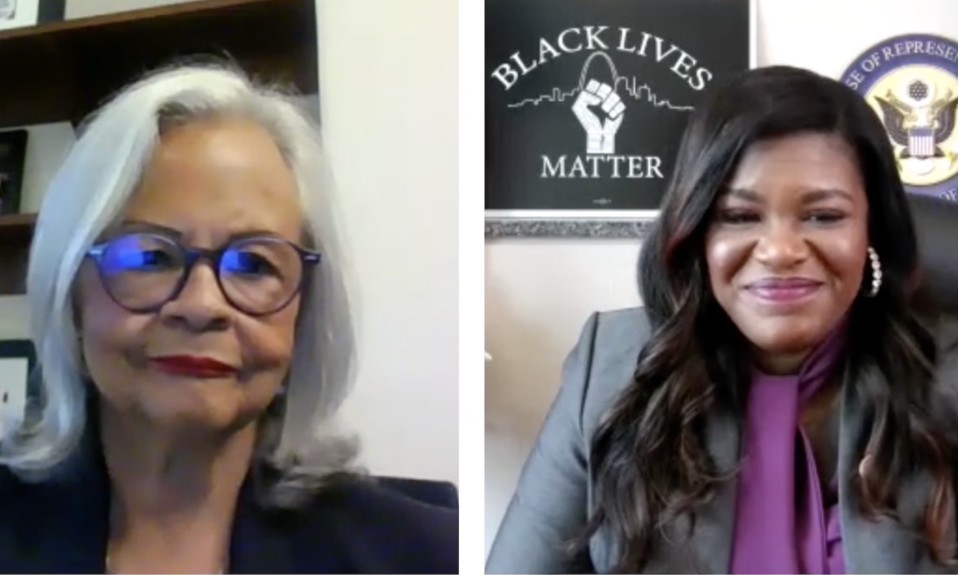The DPRA, introduced by U.S. representatives Bonnie Watson Coleman and Cori Bush [pictured left to right], seeks to shift drug policy to a health-centered approach
By Jason Langendorf
In the lengthening shadow of a drug epidemic that has led to record numbers of overdose deaths, Americans are showing more support than ever for alternatives to punitive actions against drug users. That includes lawmakers who this week revealed a plan to fundamentally change the way the federal government approaches drug use, addiction and treatment.
Representatives Bonnie Watson Coleman (D-N.J.) and Cori Bush (D-Mo.) on Tuesday announced the Drug Policy Reform Act (DPRA), a bill that would end criminal penalties for drug possession at the federal level. The legislation, developed with the input of strategic partner the Drug Policy Alliance (DPA), would shift regulatory authority from the Attorney General to the Secretary of Health and Human Services (HHS), expunge records and provide for resentencing, and reinvest in alternative health-centered approaches.
“Our approach until now has not been to help sick people with treatment or counseling, but to throw them in jail,” Rep. Watson Coleman said during Tuesday’s virtual press conference about the bill. “Along the way, we’ve seen millions get swept up in a criminal justice system that completely derails their lives and those of their families.”
I’ve seen it work—wraparound services to prevent and treat substance use and reduce harm. This bill would encourage states and local governments to follow suit.”—Rep. Cori Bush (D-Mo.)
The Drug Policy Reform Act would eliminate many of the lifelong consequences associated with drug arrests and convictions, including the denial of employment, public benefits, immigration status, driver’s licenses and voting rights. In addition to reversing the ongoing harm of drug criminalization, the bill aims to correct decades of racial and social injustices resulting from American drug policy while also instituting evidence-based substance use treatment and education programs for all.
“I’ve seen it work—wraparound services to prevent and treat substance use and reduce harm,” says Rep. Bush. “This bill would encourage states and local governments to follow suit. In the same way that the drug war and the 1994 crime bill that came after it intensified mass incarceration, this bill would help initiate mass ‘decarceration’ as part of our work to help save lives.”
Why Drug Decriminalization?
Thirty years ago, Portugal was ensnared in its own drug crisis, in which, according to Statista, one in every 100 Portuguese became addicted to heroin, and the rate of HIV infection was the highest of any country in what is now the European Union. A series of key policy changes—beginning with the 2001 decriminalization of drugs and including expanded access to treatment and the implementation of widespread needle exchange programs—yielded dramatic results: From 1999 to 2016, the annual number of overdose deaths in Portugal dropped from 369 to 30, and from 2000 to 2017 the yearly number of new HIV diagnoses due to drug injections plummeted from 907 to 18.

Meanwhile, in the United States, more than seven million people were arrested for marijuana possession from 2001 to 2010, according to Rep. Watson Coleman, contributing to the highest incarceration rate in the world. “And none of this,” she says, “has made a dent in our use of drugs.”
The United Nations, World Health Organization and American Public Health Association, among other health- and policy-based coalitions, have publicly endorsed the decriminalization of drug use in recent years. A survey from the Drug Policy Alliance and the American Civil Liberties Union (ACLU) released last week suggests a groundswell of support for U.S. federal drug decriminalization, and even some factions of law enforcement are beginning to realize the implications of decades of misguided policy.
Major Neill Franklin, a 34-year police veteran, is a former narcotics agent for the Maryland State Police, a former commander of training for the Baltimore Police Department and the current executive director of the Law Enforcement Action Partnership. He says “it’s about time” that a public health issue was put in the hands of the appropriate experts. Franklin also notes that decriminalization, although difficult to accept for many police officers who have been so deeply involved in the drug war, can be an impetus for other reforms.
“This piece of public policy is absolutely critical for police reform in this country, which is a very, very hot and important issue right now,” Franklin says. “Because it is the War on Drugs, this piece of public policy, it’s one of the main reasons that we, the police, and our community members have conflicts with one another.”
What’s Next for the DPRA?
The Drug Policy Reform Act hasn’t arrived on the floor of Congress yet, but Rep. Watson Coleman, who says “we recognize that we’re beyond this being urgent,” expects to formally introduce the bill within days.
Rep. Watson Coleman says an 18-member expert commission will be assembled to advise the Secretary of Health and Human Services as part of this legislation. DPA policy manager Queen Adesuyi echoes the importance of expert guidance and evidence-based practices informing policy.
“The bill does take some steps to make sure that federally funded drug education is actually grounded in science,” says Adesuyi. “Too much drug education that’s been put out by our government has been propaganda and has not been culturally competent and trauma-informed. So the bill is taking those steps towards making sure that we have appropriate education, so that people can make informed decisions about their own drug use.”
We have an opportunity to put this dark chapter in American history behind us and move forward with a mind toward healing.”—Rep. Bonnie Watson Coleman (D-N.J.)
Because the Drug Policy Reform Act incentivizes state and local governments to adopt decriminalization policies by otherwise limiting their eligibility to receive funds in the Byrne and COPS grant programs, its architects hope for a swift passage of the bill at the federal level followed by states then falling in line with similar health-based drug policies.
Says Rep. Watson Coleman: “We have an opportunity to put this dark chapter in American history behind us and move forward with a mind toward healing.”
Bottom photo: Dev Asangbam














